| |
Summary:
Comet McNaught swung by the Sun in mid-January
2007. Fierce solar heat turned it into the brightest comet in 40
years; for a few days it was actually visible in broad daylight!
When McNaught emerged from the sun's glare into the skies of the
Southern Hemisphere, the tail alone stopped traffic and was mistaken
for a brush fire, an explosion, a mysterious cloud and probably
many other things never reported. For photographers, it was the
photo-op of a lifetime. Now Comet NcNaught is receding into the
outer solar system never to return -- only the pictures remain. Enjoy
the gallery! |
 |
| |
| |
Photographer,
Location |
Images |
Comments |
|
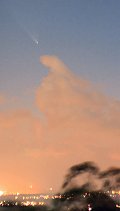
|
Peter
Ward,
Mt Coottha, Brisbane Australia
Jan. 29, 2007 |
#1,
more |
The
cloud formation pointed it out to me!
Photo
details: Canon
EOS 30D, EF
50mm lens, f1.4, 8 seconds exposure |
|
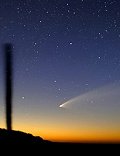
|
Gordon
Garradd,
Siding Spring Observatory, NSW, Australia
Jan. 29, 2007 |
#1,
more |
Comet
McNaught was an obvious naked eye object with 15 degrees
of tail visible this morning. Gale force winds were blowing
at the edge of the cliff so I had to hold the tracking mount
down to prevent it moving during exposures. |
|

This
photo is a must-see
in full size.
|
Minoru
Yoneto,
Queenstown, New Zealand
Jan. 28, 2007 |
#1,
#2, #3,
more |
We
can observe this comet at here lat. 45 degrees S all night
long.
Photo
details: Pentax
*ist DS, Sigma
15mm lens, ISO 800, 300s exposure |
|
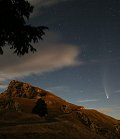
|
Steve
Grooby,
Te Mata Peak, Havelock North, New Zealand
Jan. 29, 2007 |
#1 |
This
comet has certainly got people interested in astronomy again.
Photo
details: Canon
EOS 5D & 24-105f4L, 24mm
lens, 20sec, ISO 800 |
|

|
Grahame
Kelaher,
Mudgee Observatory, NSW, Australia
Jan. 29, 2007 |
#1,
#2, more |
Good
morning Comet McNaught! We were able to observe the tail
for 2 hours before the head rose above the horizon. |
|
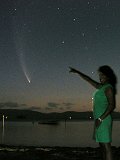
|
Geoff
Sims,
Green Point (near Forster), NSW, Australia
Jan. 26, 2007 |
#1,
#2, #3,
#4 |
Here
is Comet McNaught on Australia Day, setting over the lake
near Forster, on the Mid-North Coast of NSW, Australia.
Even with a quarter Moon in the sky, the Comet was looking
spectacular.
Photo
details: Olympus
C-5050, lens at 7.1mm, 16seconds at f/1.8, ISO 400.
|
|

|
Luke
Calder,
Crown Terrace, Otago, New Zealand
Jan. 28, 2007 |
#1 |
Fianlly
got a clear night! Not as bright as it was but still a great
show.
Photo
details: Canon
30D, 28mm
lens, 800 ASA, 3.5, 30sec exposure taken at 12.30am
|
|
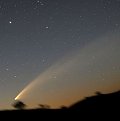
|
Melissa
Hulbert,
Mudgee Observatory, NSW, Australia
Jan. 28, 2007 |
#1 |
It
was amazing to be able to watch the comet set and then less
than 6 hours later watch it rise in the early morning sky.
Photo
details: Canon
20D, 30mm f/4.5, 245secs, ISO 800, 18:00UT |
|
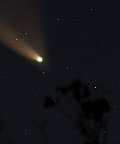
|
Andrew
Catsaitis,
Central Coast, NSW, Australia
Jan. 28, 2007 |
#1 |
Comet
McNaught still putting on a great show even under bright
moonlight!
Photo
details: Canon
20Da and 5" refractor, ISO 1600, 10 sec exp. |
|
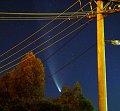
|
Perica
Vujic,
Canberra, Australia
Jan. 26, 2007 |
#1 |
This
is a shot of Comet McNaught taken from my back yard at about
9:30pm on the 26th January 2007. This is the first comet
that I've seen this bright with the naked eye, very impressive!
|
|
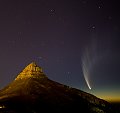
|
Steve
Coetzee,
Cape Town South Africa
Jan. 20, 2007 |
#1,
more |
The
best I have seen in my life--so bright you can nearly reach
up and pick it out of the sky. |
|
|
|